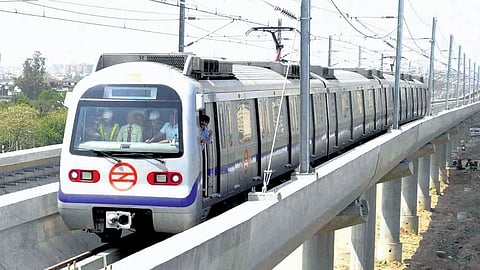Delhi Metro ready to help projects in Saudi Arabia, Kenya and El Salvador
NEW DELHI: Delhi Metro Rail Corporation (DMRC) may help more international projects as the authorities in Saudi Arabia, Kenya and El Salvador have approached the Indian company for partnership.
The Delhi Metro is currently implementing a Metro rail system in Bangladesh and has provided consultancy services in Jakarta. “Countries like Israel, Saudi Arabia (Riyadh), Kenya, and El Salvador have also shown interest in partnering with DMRC for their Metro development projects,” informed Minister of Housing and Urban Affairs (HUA) Manohar Lal.
He further said that given the rapid expansion of the Metro in the country, India will soon surpass the United States of America, which has the third largest Metro network.
With the approval of three new projects, India now has 1,018 km of Metro lines under construction, said Lal. On Friday, the Cabinet approved Metro projects for three prominent cities; Bengaluru, Pune and Thane, costing Rs 30,765 crore.
“We are poised to soon surpass the US and become second only to China,” he remarked, attributing this success to the ‘Make in India’ initiative championed by PM Narendra Modi.
Regarding the Rapid Rail Transit System (RRTS), the minister said, “The first RRTS corridor of 82 km between Delhi and Meerut has been sanctioned at a cost of Rs 30,274 crore. Today, 34 km of this corridor is operational, with the ‘NaMo Bharat’ train running on this network. We expect the project to be completed by June 2025.”
Addressing the issue of additional RRTS corridors, the minister acknowledged delays due to resistance from the Delhi government but assured that the remaining two priority corridors connecting Gurugram, Manesar, and Dharuhera in the south of Delhi, and Sonepat and Panipat in the north of Delhi, will soon be sanctioned.
In 2014, the Metro Rail system in India was limited to just 248 km and operational in only five cities. Over the last 10 years, 700 km of new Metro lines have been made operational, bringing the total operational length to 945 km, and extending Metro services to 21 cities across the country.
Highlighting the rapid progress, Lal said, “Before 2014, on an average, only 600 metres of Metro line was being constructed per month. Today, this figure has increased ten-fold to 6 km per month, demonstrating the government’s commitment to urban development.”
He highlighted the significant strides made in indigenisation, with the majority of civil structures being constructed domestically. He pointed out that the country has developed four state-of-the-art manufacturing facilities of Metro coaches that have produced over 1,000 Metro coaches in the last five years.

